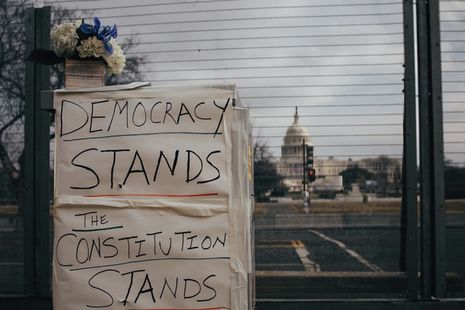A very American coup
Election results in America this year could lead to the next presidential election being overturned, argues Nick Scott

In 2017, The Washington Post, an American newspaper, introduced a new slogan: “Democracy Dies in Darkness”. The past five years have proved the slogan wrong. Democracy doesn’t die in darkness. Democracy in the United States is dying before our very eyes.
This is a rather bold claim, and I certainly don’t believe that American democracy has no chance of survival or that we should give up all hope. I do think, however, that it is in grave danger.
There are various ways in which democracy in America can be said to be under threat, such as the Senate filibuster or new restrictive voting laws in many states. Focusing on two upcoming elections in Georgia – which has been called “America’s most important swing state” – will illustrate just how close America is to the result of its presidential election being overturned (in other words, a coup).
The first is for Secretary of State, a position that involves overseeing local, state and federal elections in Georgia. This is a partisan position; in 2018, Republican Brad Raffensperger narrowly defeated the Democratic candidate for the office, having been endorsed by then-President Trump.
“Democracy doesn’t die in darkness. Democracy in the United States is dying before our very eyes”
You might ask if making election administration a political office could cause problems, such as if the Secretary of State seeks higher office and manipulates the election they are taking part in. Well, look no further than 2018, when Republican Brian Kemp was accused of doing just that during his (successful) campaign for Governor.
One thing that is important to understand is that (unlike in Britain) elections in the United States are generally preceded by a primary election, where supporters of the two main parties choose their party’s candidate. Despite running for re-election this year, Raffensperger is facing a primary challenge from a member of his own party, Congressman Jody Hice – who has been endorsed by Trump. The reason? After the 2020 presidential election, in which Joe Biden narrowly won in Georgia, Trump called Raffensperger, saying “there’s no way I lost Georgia” and telling him to “find 11,780 votes”. Raffensperger, who has received death threats for standing up to Trump’s lies about the election, refused. Hice, by contrast, alleged in December 2020 that election fraud in Georgia had been “widespread”; prediction markets give him an 80% chance of winning. If Trump runs for re-election in 2024, as many expect him to, and asks Hice to find votes for him, how will Hice respond?
“And in 2024, the presidential election could be won so decisively that regardless of what happens in Georgia, the Democrat (or indeed Republican) will still triumph”
For Governor, meanwhile, Brian Kemp, who signed a restrictive voting law and has championed other conservative causes (“there’s no Democratic Governor as left-wing as Brian Kemp is right-wing”, says commentator Drew Savicki) is nevertheless facing a primary challenge from former senator David Perdue. Perdue has made false claims of election fraud central to his campaign, calling for a new police unit to investigate voter fraud and audits into election results in the state. Worse still, he has claimed that (unlike Kemp) he would not have certified the 2020 presidential election results in Georgia. America’s unique electoral system, where voters choose electors as part of the Electoral College rather than voting for candidates directly, is how “one rogue governor could steal the election”, as a recent article warns.
Of course, Hice and Perdue are far from guaranteed to succeed in their challenges, and even if they win their primaries, they could easily lose in the November 2022 general election to Democratic opponents, with many arguing that Trump’s support for extremist candidates could ultimately hurt Republicans. And in 2024, the presidential election could be won so decisively that regardless of what happens in Georgia, the Democrat (or indeed Republican) will still triumph. But the fact that any of this is possible – that a former president could regain his former role as the most powerful person in the world, despite losing a free and fair election, due to the actions of loyalists he has helped gain key roles – should scare all of us.
Whilst Georgia has been discussed in this article, I could have easily written about a different state; the same patterns are being repeated across America. In Arizona, a swing state that chose Biden in 2020 by even fewer votes than Georgia, the Republican frontrunner for governor is the Trump-endorsed former TV anchor Kari Lake, who has called for the imprisonment of Democratic Secretary of State Katie Hobbs (her likely opponent in 2022) based on false claims about the 2020 election. For Secretary of State, meanwhile, Trump has endorsed lawmaker Mark Finchem, who attended the “Stop the Steal” rally that led to the storming of the US Capitol (he denies taking part in the riot). The Republican-controlled State Senate even ordered an audit of the presidential election results in the state (which found that Biden did indeed win). Despite this result, Republicans in other swing states, such as Wisconsin, are pushing for similar audits. Trump has also endorsed a candidate for Secretary of State in the battleground state of Michigan, where a different Republican candidate for the position encouraged Republicans to “show up armed” to polling stations.
After the Constitutional Convention of 1787, Benjamin Franklin, one of the Founding Fathers, was asked “Well, Doctor, what have we got—a Republic or a Monarchy?“. “A Republic—” Franklin replied “—if you can keep it.”
 Features / Should I stay or should I go? Cambridge students and alumni reflect on how their memories stay with them15 December 2025
Features / Should I stay or should I go? Cambridge students and alumni reflect on how their memories stay with them15 December 2025 News / Cambridge study finds students learn better with notes than AI13 December 2025
News / Cambridge study finds students learn better with notes than AI13 December 2025 News / Uni Scout and Guide Club affirms trans inclusion 12 December 2025
News / Uni Scout and Guide Club affirms trans inclusion 12 December 2025 Comment / The magic of an eight-week term15 December 2025
Comment / The magic of an eight-week term15 December 2025 News / News In Brief: Michaelmas marriages, monogamous mammals, and messaging manipulation15 December 2025
News / News In Brief: Michaelmas marriages, monogamous mammals, and messaging manipulation15 December 2025










